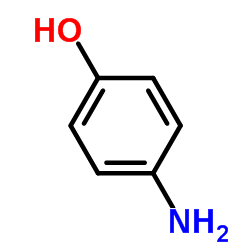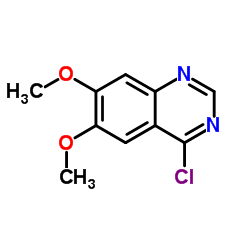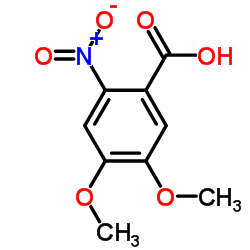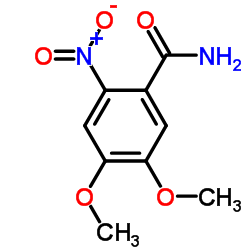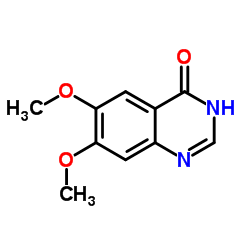202475-60-3
| Name | Janex 1 |
|---|---|
| Synonyms |
4-[(6,7-Dimethoxy-4-quinazolinyl)amino]phenol
1-Amino-4-<4-hydroxy-anilino>-anthrachinon-2-sulfonsaeure 4-[(6,7-dimethoxyquinazolin-4-yl)amino]phenol Phenol, 4-[(6,7-dimethoxy-4-quinazolinyl)amino]- 4-(4-hydroxyphenylamino)-6,7-dimethoxyquinazoline JAK3 INHIBITOR I JANEX-1 |
| Description | JANEX-1 is a potent and specific JAK3 inhibitor (estimated Ki=2.3 μM). JANEX-1 (WHI-P131) shows potent JAK3-inhibitory activity (IC50 of 78 μM), does not inhibit JAK1 and JAK2. |
|---|---|
| Related Catalog | |
| Target |
JAK3:78 μM (IC50) |
| In Vitro | JANEX-1 (WHI-P131) shows potent JAK3-inhibitory activity (IC50 of 78 μM), does not inhibit JAK1 and JAK2, the ZAP/SYK family tyrosine kinase SYK, the TEC family tyrosine kinase BTK, the SRC family tyrosine kinase LYN, or the receptor family tyrosine kinase insulin receptor kinase, even at concentrations as high as 350 μM. JANEX-1 induces apoptosis in JAK3-expressing human leukemia cell lines NALM-6 and LC1;19 but not in melanoma (M24-MET) or squamous carcinoma (SQ20B) cells. WHI-P131 inhibits the clonogenic growth of JAK3-positive leukemia cell lines DAUDI, RAMOS, LC1;19, NALM-6, MOLT-3, and HL-60 (but not JAK3-negative BT-20 breast cancer, M24-MET melanoma, or SQ20B squamous carcinoma cell lines) in a concentration-dependent fashion. WHI-P131 inhibits clonogenic growth in a concentration-dependent fashion with EC50s of 24.4 μM for NALM-6 cells and 18.8 μM for DAUDI cells. At 100 μM, WHI-P131 inhibits the in vitro colony formation by these leukemia cell lines by >99%. In contrast, JANEX-1 does not inhibit the clonogenic growth of JAK3-negative M24-MET melanoma or SQ20B squamous carcinoma cell lines[1]. |
| In Vivo | JANEX-1 is administered at doses ranging from 5 to 100 mg/kg. Evaluation of CPK activity revealed a dose-response curve with an effective dose 50 (ED50) value of 7.44 mg/kg. Mice receiving JANEX-1 displayed significantly reduced CPK and LDH levels. In addition, the infarct size of JANEX-1-treated mice (30.16±2.79%) is significantly decreased when compared with I/R-operated mice (65.64±3.76%)[2]. JANEX-1 (WHI-P131) is absorbed rapidly, and the time to reach the maximum plasma JANEX-1 concentration (tmax) is 24.7±1.7 min. JANEX-1 is rapidly eliminated with an elimination half-life of 45.6±5.5 min. Although the predicted maximum plasma JANEX-1 concentration is 10.5 ± 0.8 μM, which is only half of the Cmax following i.v. administration of the same bolus dose, the i.p. bioavailability is 94.6% and the systemic exposure levels (i.e., AUC) are very similar to those observed after i.v. injection (17.1±2.2 μM•h versus 18.1±1.2 μM•h)[3]. |
| Cell Assay | The following cell lines are used in various biological assays: NALM-6 (pre-B-ALL), LC1;19 (pre-B-ALL), DAUDI (B-ALL), RAMOS (B-ALL), MOLT-3 (T-cell ALL), HL60 (acute myelogenous leukemia), BT-20 (breast cancer), M24-MET (melanoma), SQ20B (squamous cell carcinoma), and PC3 (prostate cancer). These cell lines are maintained in culture. Cells are seeded in six-well tissue culture plates at a density of 50×104 cells/well in a treatment medium containing various concentrations of JANEX-1 (0.1, 0.2, 0.3, 0.4 and 0.5 nM) and incubated for 24-48 h at 37°C in a humidified 5% CO2 atmosphere. Cells are examined for apoptotic changes after treatment with JANEX-1 by the in situ TdT-mediated dUTP end-labeling assay using the ApopTag apoptosis detection kit[1]. |
| Animal Admin | Mice[2] Pathogen-free 8-week-old male JAK3-/- (129S4-Jak3tm1Ljb) and C57BL/6 J mice are used. Mice are treated with JANEX-1 at a dose of 20 mg/kg (intraperitoneally) at 1 h before ischemia. Rats[3] Male Lewis rats are divided into two experimental groups of five and are injected either i.v. via the dorsal vein of the penis or i.p. with a single 3.3 mg/kg bolus dose of JANEX-1. The rats are anesthetized by the methoxyfluran, and blood samples (0.2 mL) are collected from rat tail vein before and at 5, 10, and 30 min and 1, 1.5, 2, 3, 4, and 6 h after i.v. injections or at 5, 10, 15, 30, and 45 min and 1, 1.5, 2, 3, 4, 5, and 7 h after i.p. injections. |
| References |
| Density | 1.3±0.1 g/cm3 |
|---|---|
| Boiling Point | 468.1±40.0 °C at 760 mmHg |
| Molecular Formula | C16H15N3O3 |
| Molecular Weight | 297.309 |
| Flash Point | 236.9±27.3 °C |
| Exact Mass | 297.111328 |
| PSA | 76.50000 |
| LogP | 2.73 |
| Appearance | light yellow solid |
| Vapour Pressure | 0.0±1.2 mmHg at 25°C |
| Index of Refraction | 1.689 |
| Storage condition | -20℃ |
|
~85% 
202475-60-3 |
| Literature: Trieu, Vuong N.; Liu, Xing-Ping; Chen, Chun-Lin; Uckun, Fatih M. Journal of Cardiovascular Pharmacology, 2000 , vol. 35, # 2 p. 179 - 188 |
|
~% 
202475-60-3 |
| Literature: Journal of Cardiovascular Pharmacology, , vol. 35, # 2 p. 179 - 188 |
|
~% 
202475-60-3 |
| Literature: Journal of Cardiovascular Pharmacology, , vol. 35, # 2 p. 179 - 188 |
|
~% 
202475-60-3 |
| Literature: Journal of Cardiovascular Pharmacology, , vol. 35, # 2 p. 179 - 188 |
|
~% 
202475-60-3 |
| Literature: Journal of Cardiovascular Pharmacology, , vol. 35, # 2 p. 179 - 188 |
| Precursor 6 | |
|---|---|
| DownStream 0 | |
